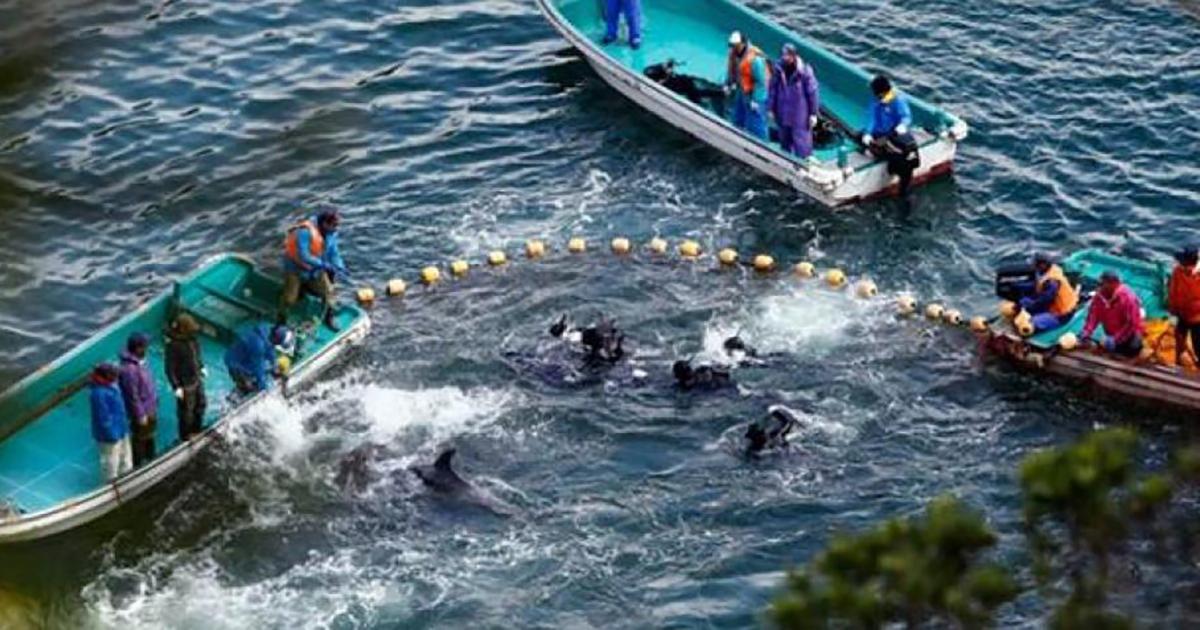Penalize and close the dolphin hunt in Taiji, Japan, and in other parts of the world where they perform this abomination
people signed. Let's get to 50,000!

Addressed to: Prime Minister of Japan Shinzō Abe
The annual dolphin hunt in Taiji, Japan, takes place every year between the months of September to April. According to the Japanese Fisheries Research Agency, 1,623 dolphins were captured in Wakayama Prefecture in 2007 for human consumption or the resale of dolphinariums. Most of them were captured in Taiji. The annual dolphin hunt is a source of income for local residents, but it has received worldwide condemnation, both for the cruelty of dolphin killing and for the high mercury levels of dolphin meat.
The residents of Taiji have refined the techniques of whaling and have had important operations in this activity since the 17th century. It became known as a whaling center in 1675. The hunting of dolphins for commercial purposes in Taiji continues today. In 2008, 1,484 dolphins and whales were captured, this number was raised around 2,400 for the year 2009. In 2015, 23,000 dolphins and whales were captured, rising year after year.
Since 2000, researchers like Tetsuya Endo (a professor at Hokkaido University of Health Sciences) have found high concentrations of mercury in whale and dolphin meat sold throughout Japan. In their studies, residents of Taiji who eat dolphin meat had raised the level of mercury in their body according to hair tests.
An investigation was conducted by the National Institute for Minamata Disease (NIMD) in 2008 to check the levels of mercury in 7 pieces of whale meat (two of which came from Taiji). Their results showed that Taiji meat had more than 13 ppm of mercury; more than 65% of which was methylmercury. The whale entrails (which are also consumed in the city) had a high concentration of mercury caused mostly by inorganic mercury. The Japanese Ministry of Health issued warnings about the consumption of some species of fish, whales and dolphins since 2003. It is recommended that children and pregnant women avoid eating them on a regular basis.
In 1979, environmentalist Hardy Jones traveled to Taiji for the first time to try to free 200 head melon dolphins that had been captured by fishermen for feeding the lions at Shirahama Zoo. In 2003, two activists who released pilot whales and were arrested for forceful obstruction of businesses and property damage, spent 23 days in jail, and were released after paying fines of $ 5,000 and $ 3,000 each.
The documentary entitled The Cove ("The Cove"), secretly recorded the systematic slaughter of dolphins by the fishermen of Taiji. All activity always protected by the Japanese police and authorities, who at all times try to prevent, even using force and threats, any access to knowledge of the cruel and bloody (hand harpoons) fishing gear that is used. It also showed in a resounding way the consumption of dolphin meat, protected by the authorities, labeled as whale meat, with the great danger of ingesting a highly toxic meat because it contains a high concentration of mercury because the dolphin is at the top of the alimentary trophic chain, accumulating the toxic metals poured by the man in the seas. He also showed the cynicism and illegal and unethical maneuvers of the Delegation of Japan in the IWC with the aim of continuing to hunt whales in a supposed culture and custom of his people, today nonexistent as such. For this they "bought" the votes of very small countries that do not even have cetacean habitats in their territories. All under the name of "scientific hunting". This documentary generated great controversy in the world, especially in the International Whaling Commission -CBI-. According to the film, it is estimated that around 23,000 dolphins die each year in Taiji (in contrast to 1,600 captures according to the Japanese Fisheries Research Agency).
SIGN AND SHARE THIS PETITION
The content of the petitions and the opinions expressed here are the sole responsibility of the author.
